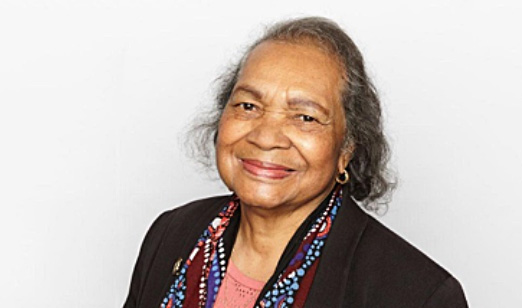
Aunty Joan
We at Reconciliation NSW have been lucky enough to have Aunty Joan on our board and involved in the organisation for a number of years. Her commitment to education and reconciliation is what makes her such an essential part of this movement and a very special patron for Reconciliation NSW.
‘Education has been the doorway for me. I came to it after raising my family and I believed it was the way forward for my children. I’m proud of the educational choices they have made and if any one of them decides to go further, I will be there for them.
I see my role as working within education systems to make changes and create space for my people. I’m people oriented and I often take the emotional perspective – looking at what it’s like to be in their shoes because I’ve been there. At UTS I work with other university staff to provide training in cultural diversity and raising awareness of legislative requirements that relate to staff and students.
I introduce myself at formal functions by saying, “I’m a Murri woman from Wakka Wakka country in Queensland.” In explaining, ”country “, I let people know that “belonging to country” gives us our identity. I also add that we are not homogenous but are as diverse as the peoples of Europe and Asia in languages and cultures.
Before colonisation, at least 70 Aboriginal languages and dialects were spoken in NSW and over 100 in Queensland. But many have been lost or eroded because of past policies – my people were discouraged, shamed and forbidden to speak or teach their traditional languages.
To us, language is much more than just words. It is a direct link to land and country. It holds traditional songs and stories. It is about spirituality, and reflects our unique ways of looking at the world. It is vital in sustaining a person’s sense of self and cultural identity.
For me, my “Country” relates to my mother’s or my father’s place, where generations of my people lived and looked after country, a place where they had a total sense of belonging. If one was removed from Country, the ‘belonging to that country” remained embedded. Many of our languages were lost or went underground because we were forbidden to speak them. At the time of writing, I believe there is now a federal program to revive them. Elders who are fluent speakers of their language now feel that they can share it thus giving the wider community a greater appreciation of this rich heritage.
Under the Queensland Assimilationist and protection policies I had to have permission where to live, to marry or to leave the Mission. Cherbourg was an institution where we were referred to as “inmates” and the manager was officially the “Superintendent”. English is my second language – I first spoke Aboriginal English. There were at least 49 languages, but we weren’t allowed to speak any one our traditional languages. Our old people were severely punished if any one of them was caught teaching the younger ones their language.
In the early 1960, I absconded from Cherbourg and came to Sydney alone. I got married down here. Over the years I worked in all kinds of jobs to help support my husband and family – I worked in factories, cleaning offices, laundering business men shirt and night shift at a large public hospital.
In the late 1960s when the children started school I decided to go to college to further my education. I began saving for my studies and childcare fees before enrolling in a commercial college as there wasn’t any financial allowances for educational studies. I enrolled in a commercial course, and gained high distinctions. I then went on to complete a teaching degree, and a diploma in computing.
I began teaching office administration at a TAFE college, where I was the only Aboriginal teacher and my students were non-Indigenous. I found that I could help new non-Indigenous teachers by sharing my teaching resources.
It was through this work that I became involved with teachers’ unions. In the 1980s I set up and chaired the national TAFE Indigenous Advisory group to the Australian Teachers’ Union.
In 1989, as a Manager in NSW TAFE Aboriginal Education Unit, I was able to give back to Indigenous communities by taking part in many programs helping them to find jobs and re-enter educational studies. One of the first programs I managed was helping young Indigenous people to join the NSW Police force. I also advised non-Indigenous teachers on cultural appropriateness when teaching our mature-aged students.
At UTS I chair the Reconciliation working party. For me it’s being able to save Indigenous knowledge, and getting academics to acknowledge and value it. I feel we could do more – we’re setting up knowledge centres around the country. Some academics question the validity of oral history, but my perspective is that all history is oral: the first step is to talk and listen.’
My local community involvement is as Chair of an Indigenous advisory group for Canterbury Council, advising on issues and programs for Indigenous people in Canterbury municipality.
The role of an elder
‘I have five children and 10 grandchildren. Sometimes my family forget how old I am – I’m working full days, but what keeps me going is working with people and the intellectual stimulus. I’m not thinking about retirement yet.
They say I’m a living library – so now I’m being asked to talk in schools and tell stories to the children. Staff at UTS calls me Aunty Joan. When you’re regarded as an elder, it’s not about age; it’s about your contributions and by the standing as others see you. I’ve been down here in Sydney for 50 years, and the Elders in Cherbourg are all asking “when are you coming back up to Queensland?”– so maybe before too long I will go back.’
